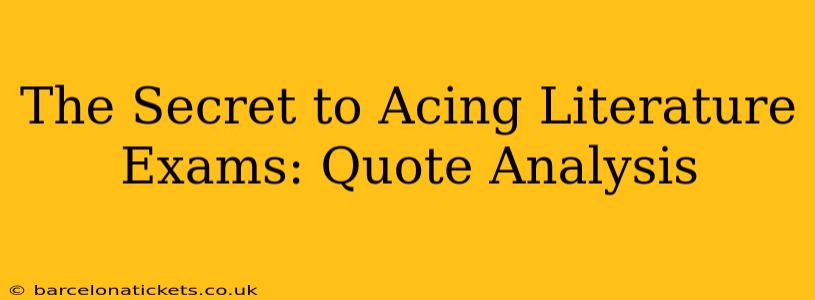Literature exams can be daunting, but mastering quote analysis is the key to unlocking high marks. This isn't just about identifying quotes; it's about understanding their context, significance, and how they contribute to the overall meaning of the literary work. This comprehensive guide will equip you with the skills and strategies needed to confidently analyze quotes and ace your next literature exam.
Understanding the Foundation: What is Quote Analysis?
Quote analysis goes beyond simply identifying a quote and stating its meaning. It's a deep dive into the why behind the quote's inclusion. It involves examining the quote's relationship to:
- The character speaking: What motivates them? What is their role in the story? How does the quote reveal their personality, beliefs, or motivations?
- The surrounding context: How does the quote fit into the immediate scene and the larger narrative arc? What events precede and follow the quote?
- The author's intention: What point is the author trying to convey through this quote? What themes or ideas are being explored?
- Literary devices: Does the quote employ metaphors, similes, imagery, symbolism, or other literary techniques? How do these devices enhance the meaning and impact of the quote?
By considering these elements, you move from simple identification to insightful interpretation, demonstrating a profound understanding of the text.
Common Mistakes to Avoid in Quote Analysis
Many students make common mistakes that hinder their ability to effectively analyze quotes. These include:
- Simply summarizing the quote: Restating the quote in your own words without exploring its significance.
- Lack of textual evidence: Failing to support your interpretations with specific references to the text.
- Ignoring context: Analyzing the quote in isolation without considering its relationship to the surrounding narrative.
- Overgeneralizing: Making broad statements without providing sufficient evidence to support them.
- Poorly structured analysis: Lacking a clear argument or failing to develop your ideas logically.
Step-by-Step Guide to Effective Quote Analysis
Follow these steps for a comprehensive and effective quote analysis:
-
Identify the quote's context: Where does the quote appear in the text? Who is speaking? What is happening in the scene?
-
Analyze the language: Identify any literary devices used (metaphors, similes, imagery, etc.). Explain how these devices contribute to the meaning and impact of the quote.
-
Explore the meaning: What is the literal meaning of the quote? What is its deeper, symbolic meaning?
-
Connect to the themes: How does the quote relate to the major themes of the work? Provide specific examples from the text to support your analysis.
-
Consider the author's intention: Why did the author include this quote? What point are they trying to convey?
-
Develop a strong thesis statement: Summarize your interpretation of the quote in a concise and arguable thesis statement. This will guide your analysis and provide a clear focus.
How to Integrate Quote Analysis into Essay Answers
Effective integration of quote analysis elevates your essay responses. Avoid simply dropping quotes without explanation. Instead:
- Introduce the quote: Provide context before introducing the quote.
- Embed the quote smoothly: Use appropriate punctuation and integrate the quote naturally into your sentences.
- Analyze the quote thoroughly: Follow the steps outlined above to provide a detailed analysis.
- Connect the quote to your argument: Explain how the quote supports your thesis and contributes to your overall argument.
Frequently Asked Questions (FAQs)
What is the difference between a quote and a summary?
A quote is a direct excerpt from the text, while a summary is a brief overview of the text's content in your own words. Quote analysis delves into the meaning and significance of the quote, while summarizing simply restates the quote's content.
How many quotes should I use in a literature essay?
The number of quotes needed depends on the length and focus of your essay. Aim for a balance: enough quotes to support your arguments effectively without overwhelming the essay with excessive quotations. Focus on quality over quantity; analyze each quote thoroughly.
What if I don't understand a quote?
If you are struggling to understand a quote, consult secondary sources (critical essays, literary guides), discuss it with your teacher or classmates, or reread the surrounding context carefully. Pay close attention to the surrounding sentences and paragraphs for clues to its meaning.
By mastering these strategies, you’ll transform quote analysis from a daunting task into a powerful tool for achieving success in your literature exams. Remember, effective quote analysis showcases a deep understanding of the text and elevates your analytical skills to impress your examiners.

